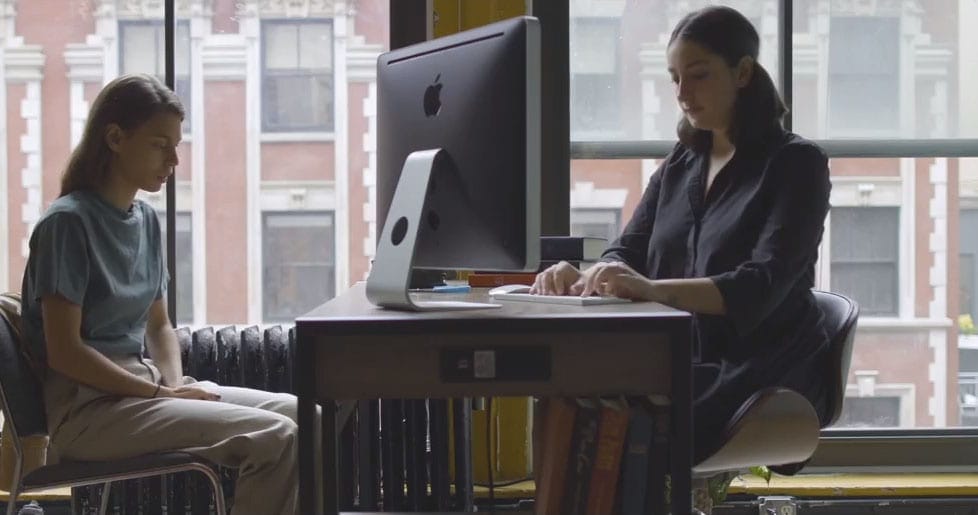Sexual crime requires sensitive viewing, even more, sensitive portrayal, but what do you do when the lines blur between the perpetrators and the victims? Director-Writer Gary O. Bennett’s Getting A Scholarship is a 6:34 minutes long film on a student-professor relationship that goes sour after one accuses the other of taking advantage of her. That by the end of it, you are left as clueless, shocked and numbed as its characters remain the highlight of the film.
Lucy (Carolina de’ Castiglioni) is an undergrad student who is stunned at her own recently procured A-grade. As she sits in the office of her marker, Prof. Bella, played by the very talented, Ekin Naz Demirok, the story begins to unfold. An invite to have drinks at the local pub in the University campus leads to an unexpected night out. By morning, not only is one of the characters left with the trauma of possible sexual abuse but a thank you note in the form of stellar grades. But, is that the true extent of the story? Is that how it really played out? Could there be grey to this very seemingly straight plotline?
For a film with such a minuscule duration, the narrative is edgy, well-paced and explosive. Not only is the acting by the duo (Castiglioni & Demirok) brilliant, to say the least, the writing is also solid. Each character is given its own arc, its own trajectory and by the mid-point of the storyline, they converge to form a spectacular kaleidoscope of subtexts, parallel lines and an overarching theme of abuse, power and authority.
The film starts with a nervous Lucy as she sits opposite Bella, composed and sure. As the accusations and self-defences go flying about in the closed confines of Bella’s office, it doesn’t take a genius to read between the lines. The well-prepared replies and counters Bella has at her disposal, the hesitant but sure questions Lucy throws at her – this isn’t the first time it’s happening; this isn’t rehearsed, but a repeat of several conversations had before. But, just as you’re about to throw your own verdict to the crime, you are given the blow. Not all victims want justice the way law enforces it. Not all perpetrators get caught, and certainly not all pay the same price. As the roles begin to get reversed, you begin wondering at the nature of the crime, in general. Here we have a case of inexperience versus age, helplessness versus authority and shrewdness to counter even the smartest. As Bella’s self-assuredness starts to crack, as Lucy’s tales begin to solidify, we have a clear winner, or do we?
Bennett lets his story do the talking. There’s no philosophy to bind what the characters go through, no theory to justify their rationale, just an open mind to empathise and reflect at how crime, vengeance and justice can be vague and yet possible at offering closure.
As cinematographer Nico Alvo’s lens captures Lucy and Bella’s faces, their barely hidden emotions, the close-ups daringly close, the handheld shots both distancing and stifling the characters, suddenly the confined indoors of Bella’s office offers both, a suffocating environment and a liberating space. Athena Boutari’s editing keeps the film tight, steady and very, very engaging, as ‘An Oddly Formal Dance’ by Blue Dot Sessions plays in the background. When the camera zooms in on Demirok in the final shot, her face a picture of her furiously running mind and its thoughts, the film offers more questions than answers. If not for the well-matched performances by both the women, it could have very easily slipped into the narrow ravines of a black-and-white story of abuse and redemption.
Highly recommended!
#ShortFilmReview: Getting A Scholarship: You'd think justice is the advantage of the stronger… Share on X